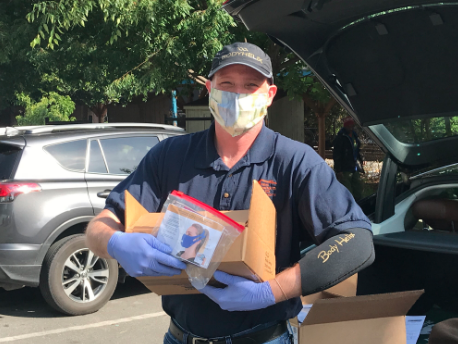Three Local Nonprofits Adjust Efforts to Align With What is "Now Normal"
By Ken Garfield
For nonprofits working to care for neighbors in need, the latest phase in these unprecedented times has a new name: Now Normal.
As our community eyes a return to some level of life before COVID-19, nonprofits are heeding Gov. Roy Cooper’s three-phase approach that puts safety first. Slowly and carefully, with the health of clients, staff and volunteers in mind, nonprofits are poised to remobilize while retaining the best of what they’ve done sheltering in place.
Here are three illustrations that reflect Now Normal in the nonprofit world in and around Charlotte.
The tents that have sprung up around Urban Ministry Center/Men’s Shelter of Charlotte during the pandemic remind us of the urgency of the mission to end homelessness. Urban Ministry Center/Men’s Shelter of Charlotte has continued sheltering the homeless and providing such day services as its soup kitchen, showers and laundry, though on a slightly limited basis. Social distancing, sanitizing and other precautions have been priorities. Room in the Inn, the winter program in which congregations and others welcome the homeless, was cut short by the pandemic. All volunteer engagement, too, was put on hold. When the all clear is given, Chief Engagement Officer Randall Hitt says day service hours will eventually return to normal with volunteers being welcomed back when the organization believes it’s safe and healthy to do so. The challenge is knowing what “normal” will look like. A new level of training will include the need for masks, gloves, sanitizing and distancing, as well as reminding folks to stay home if they are not feeling well. Hitt says the Center is especially sensitive to the fact that many volunteers are older. It will be important to give them peace of mind that their health is not at risk, he says. In the midst of planning the next phase of its COVID-19 response, Urban Ministry Center/Men’s Shelter of Charlotte has shared exciting news: With the merger of the two organizations, there is a new name for the ministry –Roof Above.
Lily Pad Haven, which provides housing and other support for victims of human trafficking, had three of its five houses occupied before the pandemic. Intake interviews for the other two houses began April 29. Safety is the first priority. Volunteers are essential to the cause, says Executive Director Benjenus Jenkins. They provide transportation to the grocery store and doctor appointments, teach budgeting, cooking healthy meals and other life skills, and generally encourage families that have been through horrifying times. During the pandemic, says Jenkins, volunteers went through virtual training. That practice proved effective and may continue. Going forward, volunteers will also fill out a health questionnaire to make sure they are properly screened to serve. Now and going forward, Jenkins says, the focus remains on trafficking victims who have found a safe place to begin again. Among the guests in late May was a mother of four. An only child, she lost her own mom when he was 16. Left to fend for herself, she was trafficked for sex. Then Lily Pad Haven welcomed her in. Says Jenkins, “Guests come first.” Lily Pad Haven estimates that 1,700 girls are trafficked in North Carolina each year.
KinderMourn, which counsels parents who have lost children and youth who have lost loved ones, has been reaching out to clients via tele-sessions. Individual counseling, support groups, the Helping The Hurt program for school children –– all of it has continued virtually. When the KinderMourn home reopens, perhaps in early June, Executive Director Kelly Hamilton says clients will have the choice of coming in or continuing tele-counseling. Staff will stagger their schedules to emphasize distancing. No one will congregate in the waiting area. Counseling rooms will be sanitized. Counselors and clients will wear masks and keep their distance.
Typically, KinderMourn’s biggest need for volunteers comes with the Hope Floats Duck Race, which draws thousands to the U.S. National Whitewater Center each Spring and raises $230,000 for the cause. Plans for the rescheduled race will be finalized in July. The KinderMourn family can’t wait for the army of volunteers to return to make it happen, because the cause of comforting the bereaved goes on. “Nothing in our world has changed,” Hamilton says. “Other deaths in our community have not stopped.”
Additionally, United Way of Central Carolinas and Foundation For The Carolinas have partnered to administer $19.1 million (and counting) in grants to nonprofits through the COVID-19 Response Fund. To learn more, visit www.uwcentralcarolinas.org. United Way President & CEO Laura Clark encourages nonprofits to see what measures proved effective during the pandemic and what might be valuable moving forward. More staff working from home? Continued use of technology (virtual visits and the like)? It’s all part of the Now Normal. “We’re going to do everything we can to keep people safe,” Clark says. “But at some point, we’re going to go back to work.”
Charlotte’s Ken Garfield is a freelance writer/editor, helping tell the stories of charitable causes. Reach him at garfieldken3129@gmail.com.




